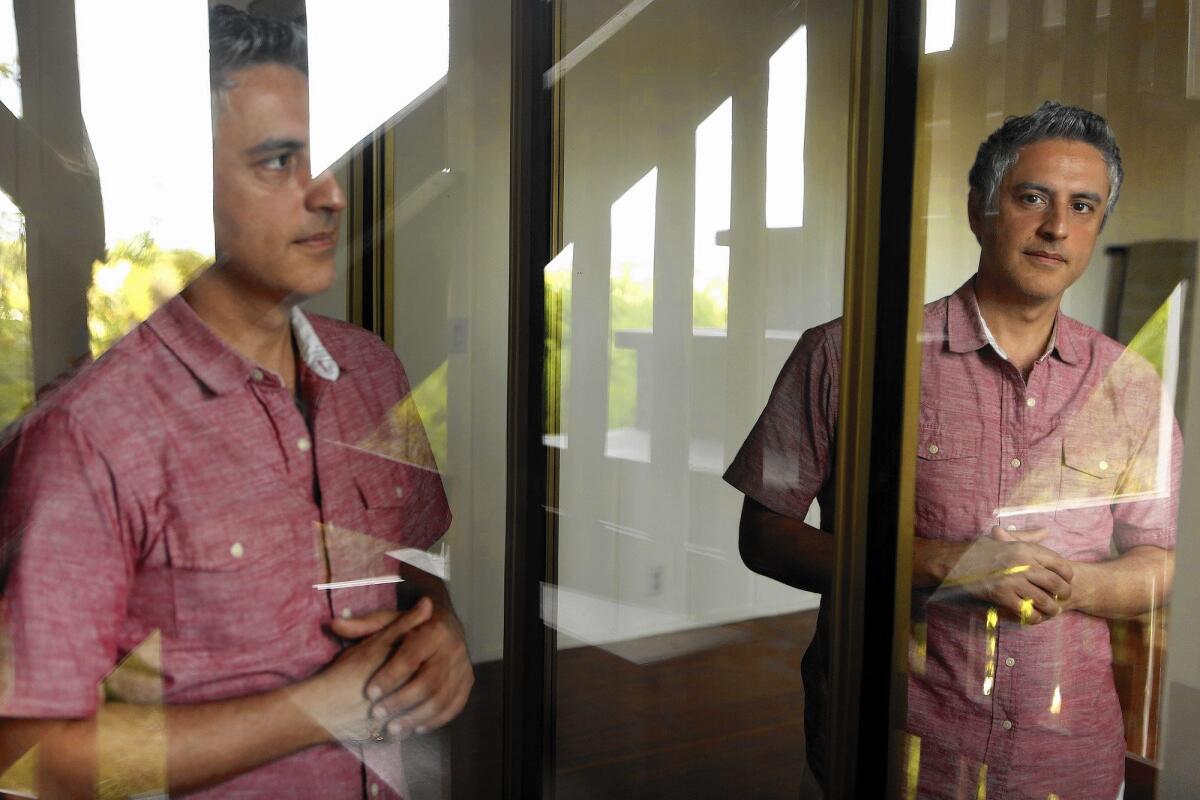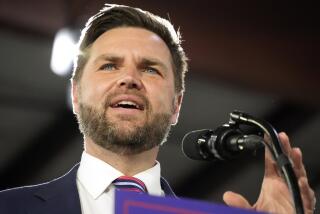Religious scholar Reza Aslan ponders Donald Trump, the power of pop culture and faith in America

Muslim religious scholar Reza Aslan is Internet famous for keeping his cool. The Iranian American author of the 2013 bestseller “Zealot: The Life and Times of Jesus of Nazareth” once confronted a relentless Fox News anchor with such unflappable poise, it made him a viral sensation.
After a successful career in academia, he’s moving beyond punditry to spread his message via pop culture. He’s co-founder of BoomGen Studios, host of the new Ovation TV talk show “Rough Draft” and of CNN’s forthcoming docuseries on religion and culture, “Believer.” “Zealot,” meanwhile, is on its way to becoming a Lionsgate feature film. At his Mt. Washington Home, the 43-year-old sat for a discussion that ranged from Donald Trump to the power of pop culture to faith in America.
From a sociological perspective, how do you explain the rise of Donald Trump?
The most important thing to know about Donald Trump is he is not a fringe character. Forty percent of Americans — not 40% of Republicans — think there should be a national registry of Muslims, 56% of Americans think that we should actually bar all Muslims from entering the United States. We keep asking: How is it that this man is getting such support in the elections. How? Because people agree with him.
How do you think Trump’s rise has affected Muslim Americans?
We now know, what has always been the case, which is that a large swath of us [is] xenophobic, racist and Islamophobic. And we pretend that we’re not. And now it’s out in the open and can’t be ignored any longer.
Many outspoken evangelicals have denounced Trump.
Thank God for that. And yet you have Franklin Graham, who has said this is the hope for America. … For Graham, it’s not that Donald Trump is a godly man who represents the qualities embodied by Jesus Christ. It’s that he also hates Muslims. And so that’s enough.
You were a born-again Christian and converted to Islam. How would you apply that notion of identity versus beliefs to your own experience of religion?
If you asked me this question when I was 16 and an evangelical Christian, I would say religion is the entirety of my identity, because that’s what I was taught. And then I went to university and began studying religion, and that’s when I realized what it truly is about.
So for you, religion was more about the beliefs than the identity?
Yes, it was all about beliefs. People who are religious are probably unwilling to recognize how much of what they believe is rooted in who they actually are and not the teachings of their religion. We think people derive their values from their scriptures. But it’s more often the case that people insert their values into their scriptures.
How does this idea apply to religious extremists then? Aren’t they all reading the scripture the same way?
The thing they have most in common is that they already possess an either anti-establishment [view] or are prone to violent tendencies. A report that just came out said something like 80% of Europeans who join [Islamic State] in Syria have a criminal record. But when someone says they are acting violently in the name of Islam, that … negates any other contributing factor that could be involved. We don’t really care about his drug addiction or his history of violent tendencies or his arrest record.
But 9/11 changed the conversation forever about Islam and terrorism.
Actually, no. Sixty-one percent of Americans have negative feelings toward Muslims today. That’s 20% higher than the immediate aftermath of Sept. 11. It’s not that 15 years ago, we were attacked by 18 Muslims and ever since then we have been Islamophobic. Instead, it’s the result of a very well-organized, extremely well-funded, concerted effort by a handful of organizations funded to the tune of now more than $50 million to convince Americans that the 1% of the population of this country that is Muslim is on the verge of a complete takeover. We are at a far greater threat from white supremacist terrorism. Since 9/11, right-wing terrorists have killed far more Americans than Islamic terrorists have.
Let’s shift gears to your creative endeavors.
I truly believe the best way to shift perceptions in this country is through pop culture. It’s always the most efficient way of doing so. We’re trying to develop television shows, feature-length films, projects that work to create a different perception of the people, the cultures, the stories, of the Greater Middle East. Part of that involves simply having Muslims and Middle Easterners being normal on TV. [With] “Rough Draft,” I wanted people to see a Middle Easterner being a host and talking about writing and not talking about politics or religion. “Believer” is my attempt to take the work I’ve done for the last two decades and present it in a very accessible, fun, participatory way that still allows you to see someone else’s religious faith in the hopes that you realize that it’s all just different metaphors for the same emotion.
And then your book “Zealot” is going to be a feature film.
James Schamus, the Oscar-nominated screenwriter and a director himself, has written the script. It’s a Jesus I don’t think you’ve ever seen on film before. We’re now in conversation with three different directors. All three of them are very different.
And you’re giving up your story to the director’s vision?
I am in a good position in that I know the material better than anyone with the possible exception of James Schamus. He turned in a 120-page screenplay with a 500-page appendix outlining the historical evidence for every scene in the film.
Aslan will appear at the Los Angeles Times Festival of Books on Sunday.
More to Read
Sign up for our Book Club newsletter
Get the latest news, events and more from the Los Angeles Times Book Club, and help us get L.A. reading and talking.
You may occasionally receive promotional content from the Los Angeles Times.






